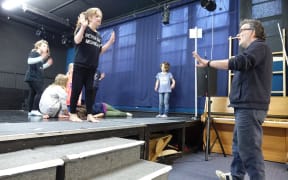A man who founded a worldwide time barter exchange movement says New Zealand's first timebank is a "flagship for the whole global movement".

A person must spend one hour of their time doing something for someone else to gain one time credit, which they can then spend on having something done for them. Photo: 123RF
The movement's founder Edgar Cahn is visiting from the US to celebrate Lyttelton timebank's 10th anniversary.
Timebanking is a growing phenomenon in New Zealand, particularly in Christchurch, where over a quarter of the country's timebanks are located.
The process of timebanking is like bartering, a person must spend one hour of their time doing something for someone else to gain one time credit, which they can then spend on having something done for them.
Mr Cahn, former counsel and speech writer to Robert F. Kennedy, and a legal professor at the University of the District of Columbia, first developed the idea in 1980. It has since expanded to 37 nations.

Lyttelton timebank members teach each other to sew, make cheese and help source rhubarb plants and instant coffee tins. Photo: RNZ / Diego Opatowski
The Lyttelton timebank had shown the power of social infrastructure in response to the aftermath of the Canterbury earthquakes, and had become a "flagship" of the movement, he said.
"Timebanking is not just about being nice to each other, it's about building social infrastructure and the flexibility of being able to respond to the unexpected."
Timebanking operated on the notion that small groups of people could come together and enhance their sense of neighbourliness, and individuals could feel as if they were making a difference, he said.
"As simple of the idea is, it runs contrary to the way we've been brainwashed... so you're dealing really with a cultural shift of how we think about value."
Project Lyttelton chairperson Margaret Jefferies started The Lyttelton Harbour TimeBank, the first of its kind in New Zealand, in 2005 after hearing Mr Cahn speak in New York.
"Edgar has a saying which is something like, you have what you need if you use what you have, so really it is matching up what your needs are and what your skills are."
Since then, the Lyttelton Harbour TimeBank has grown to almost 700 members and on average exchanges more than 2000 hours of people's time each month.
Ms Jefferies said she could not believe the number of hours the timebank was turning over.
The trend had also followed nationwide. In the last 10 years 25 timebanks had been listed with TimeBank Aoteroa New Zealand http://www.timebank.org.nz/locate
Lyttelton resident Jozefa Wylaars has been using the Lyttelton Harbour TimeBank for the last six or seven years said it was a significant asset in the community.
She said timebank requests this week included pruning, people seeking rhubarb plants and instant coffee tins, and those wanting sewing lessons.
The timebank was accessible and people were willing to help, she said.
"If I wanted to learn how to make cheese I could get someone over in a jiffy who would spend half the day with me making cheese."
She had 40 or 50 hours stacked up in her "healthy" timebank account.
Another Lyttelton Harbour TimeBank member Juliet Adams said she moved to Lyttelton in 2007 but never paid much attention to community groups until after the earthquakes, when she decided to join the timebank.
"The whole thing totally changed my life."
Ms Adams said it was more than just doing things for each other without money changing hands, it was also about getting to know people in the community and understanding their needs.
"The result is that the community is strengthened and this showed with the earthquakes."


